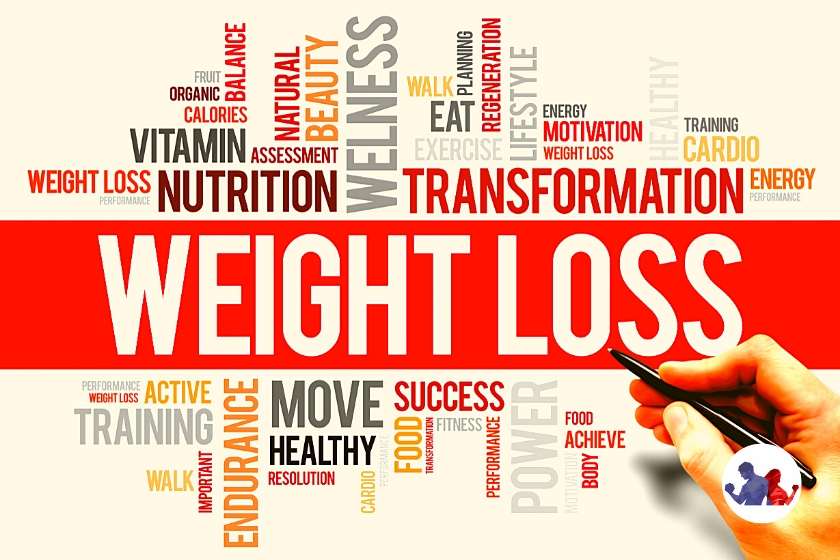There is no denying that weight loss can be frustrating. One moment we feel euphoric at having lost a few pounds, the next we feel like we’re back to square one.
Why am I not losing weight? Where is it all going wrong? And what can we do to ensure that we are successful in bringing about weight loss?
In this article, we will start by considering the main driving force behind weight loss and factors that influence it.
We will then cover ten common reasons that may explain why weight loss is simply not materializing.
Table of Contents
What Causes Weight Loss?
Weight loss occurs through something known as a negative energy balance. This is where an energy deficit is created forcing the body to break down fat to make up the shortage.
There are two main ways of establishing a negative balance.
The most common method is to restrict calorie intake. By reducing the number of calories consumed per day, the body must find energy from another source other than food.
The second way is to increase energy expenditure through regular activity. Generally increasing daily activity levels or working out more frequently can have a significant impact.
Studies have concluded that a combination of calorie restriction and increased activity levels is most optimal for weight loss (1).
Although a negative energy balance is the only requirement for weight loss, there are other factors that can influence weight loss.
For example, food choices, sleep, hydration levels, and specific medical conditions can all interfere with the weight loss process.

Ten Reasons Why You’re Not Losing Weight
In this section, we will highlight ten common reasons that explain the slow or stagnant weight loss.
1. Consuming Too Many Calories
One of the most common reasons for failing to lose weight is simply consuming too many calories.
As highlighted, creating a calorie deficit through food is one of the main methods for causing weight loss.
However, one study found that overweight individuals continued to consume too many calories per day which impeded weight loss (2).
Consuming too many calories will place the body in maintenance or a positive energy balance.
These will cause weight to remain the same or even increase.
- Related – How to Lose Fat and Build Muscle
2. Binge Eating
A habit that can be hugely detrimental to a weight loss attempt is binge eating.
Binge eating typically involves consuming large portions of calorie-dense food and drink.
It is not uncommon for people to eat well during the week and binge on the weekends.
Unfortunately, binging often wipes out the negative energy balance created during the week.
Individuals who follow this pattern may feel like they are eating well and may grow frustrated at the lack of results.
Diets do not need to be severely restrictive, however, calorie-dense products should be consumed in moderation to control calorie intake.
3. Current Exercise Is Inadequate
Along with nutrition, exercise has a huge impact on weight loss. Exercising regularly can significantly increase energy expenditure and contribute to weight loss.
In the study highlighted earlier (2), subjects were found to overestimate physical activity. Therefore, often we may not be as active as we ought to be to bring about weight loss.
Furthermore, when it comes to exercise type, it is possible that our focus is in the wrong place. Ideally, our training should have a cardiovascular and resistance element to it.
Cardio training has been associated with a high-calorie burn (3) while weight training can preserve muscle size while facilitating fat burning (4).
![]()
4. Failing To Track
Tracking is a highly effective way of ensuring that weight loss progress is being made.
Tracking calories and food and drink consumption is of significant importance.
Doing this consistently will ensure that the right number of calories are eaten to cause weight loss.
Research studies have shown that those who consistently track their calories make greater progress than those who don’t (5).
Furthermore, taking regular body measurements will give us a fuller picture of improvements.
Tracking our training progress may also be beneficial.
5. Not Eating Enough Protein
Protein is the macronutrient that plays a vital role in growth, repair, and development. There are many studies that advocate the use of high-protein diets for weight loss (6).
Protein is a highly satiating nutrient. Therefore, consuming a great quantity of it may suppress appetite and indirectly reduce calorie intake.
Moreover, it has been suggested that increasing protein intake can elevate metabolism thus increasing calorie burn (7).
Consuming plenty of protein can enhance recovery from training and also maintain muscle size during the weight loss process (8).
6. Poor Sleep Duration and Quality
When it comes to weight loss, the importance of sleep is often overlooked. Research has shown that poor sleep can increase the risk of obesity and influence body composition (9).
Firstly, it is thought that poor sleep can reduce metabolism thus reducing the number of calories naturally burned per day (9).
Sleep deprivation has also been found to interfere with two hunger hormones known as ghrelin and leptin.
Consequently, studies have determined that the sleep-deprived tend to make poorer nutritional choices, and consume too many calories (10).
- Related – Sleep and Weight Loss: Is There A Link?

7. Not Drinking Enough Water
Ensuring that we drink water regularly can help to manage calorie intake and may even influence metabolism.
The results from one study determined that consuming water before a meal significantly reduced calorie intake (11).
A study investigating water intake and metabolism concluded that drinking water regularly led to an increased calorie burn (12).
As a result of these findings, increasing water consumption may serve as a useful weight-loss strategy.
8. Drinking Too Much Alcohol
Alcohol contains seven calories per gram and, therefore, consuming a large amount of alcohol can substantially increase calorie intake.
Furthermore, many popular alcoholic beverages such as beers, ciders, wines, and alcopops contain a high number of calories.
Research on alcohol consumption has determined that heavy-use of alcohol is associated with weight gain (13).
A common method to keep calories down while drinking alcohol is to drink spirits or other low-calorie beverages.
9. Being Impatient
While weight loss can be frustrating, we must recognize that weight loss will not occur overnight. Change takes time; we must be willing to be put in the effort and be patient.
A useful guideline for weight loss is one to two pounds per week. However, it must be stressed that everyone is different and this may not be true for everyone.
Avoid being sucked in by those products and supplements that promise rapid fat loss.
These tend to be nothing more than a fad that will likely do more harm than good.
Be patient and consistent, and the results will come.
10. Medical Issues and Medicines
Lastly, a number of medical conditions may impede weight loss or promote weight gain. For example, Cushing’s disease, hyperthyroidism, and polycystic ovary syndrome.
Additionally, medications that are commonly used to treat an array of medical issues may also have a similar effect.
Research has suggested that antipsychotics, antidepressants, and corticosteroids can all contribute to weight gain (14).
Those who have concerns about their health and its impact on weight loss should speak to a physician.
Summary
At the end of the day, energy balance is of primary importance for causing all changes in body composition.
Establishing a negative energy balance will cause weight to be lost while a positive energy balance will cause weight gain.
However, it is important to recognize that weight loss is never that simple. There are a number of factors that influence weight loss and must be acknowledged.
While weight loss can often feel like a battle, it is one that can be overcome with patience, effort, and consistency.
Best Fat Burner Supplements
Our team have picked up the best fat burner supplements currently on the market to support your goals.- https://www.ncbi.nlm.nih.gov/pmc/articles/PMC3406229/
- https://pubmed.ncbi.nlm.nih.gov/1454084/
- https://pubmed.ncbi.nlm.nih.gov/25162652/
- https://pubmed.ncbi.nlm.nih.gov/17075583/
- https://pubmed.ncbi.nlm.nih.gov/21185970/
- https://pubmed.ncbi.nlm.nih.gov/25926512/
- https://www.ncbi.nlm.nih.gov/pmc/articles/PMC4258944/
- https://www.ncbi.nlm.nih.gov/pmc/articles/PMC5421125/
- https://pubmed.ncbi.nlm.nih.gov/21471283/
- https://pubmed.ncbi.nlm.nih.gov/15583226/
- https://www.ncbi.nlm.nih.gov/pmc/articles/PMC6209729/
- https://pubmed.ncbi.nlm.nih.gov/14671205/
- https://pubmed.ncbi.nlm.nih.gov/21790610/
- https://www.ncbi.nlm.nih.gov/pmc/articles/PMC6109660/
